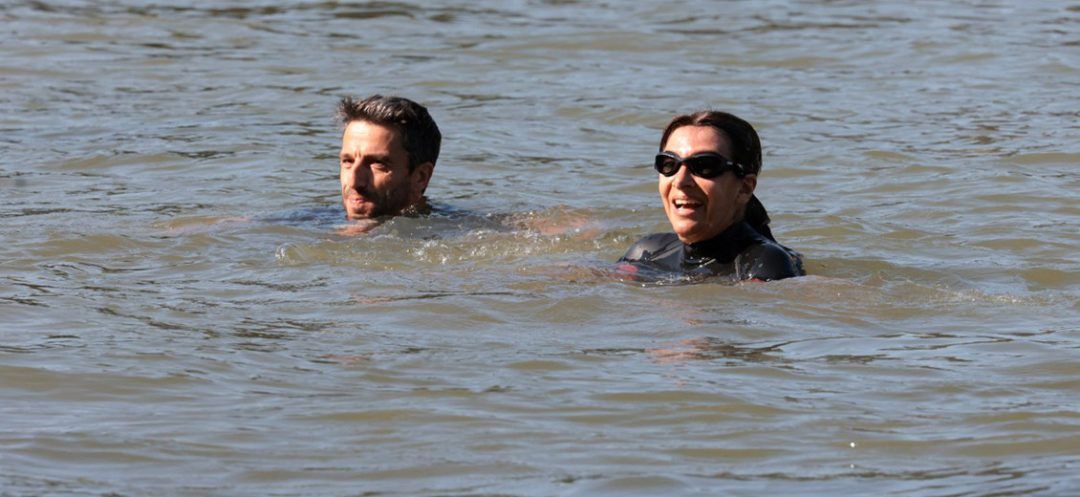
©Joel Saget / AFP
The mayor of Paris, Anne Hidalgo, swam in the murky waters of the Seine on Wednesday to demonstrate the river is now clean enough for outdoor Olympic swimming events.
Wearing goggles and a wet suit, the 65-year-old city leader swam breaststroke before immersing her face and beginning a front crawl, covering around 100 meters (yards) up and downstream.
She was joined by senior local officials and by Tony Estanguet, a triple Olympic gold medalist in canoeing who heads the organizing committee for the Paris Games, which open next week on July 26.
“Today is a confirmation that we are exactly where we meant to be,” Estanguet said. “We are now ready to organize the games in the Seine.”
Despite an investment of 1.4 billion euros ($1.5 billion) to prevent sewage leaks into the waterway, the state of the Seine has brought suspense to the build-up to the Paris Games.
Open Water
But since the beginning of July, with heavy rain finally giving way to sunnier weather, samples have shown the river to be ready for the open-water swimming and the triathlon.
“On the eve of the Games, when the Seine will play a key role, this event represents the demonstration of the efforts made by the city and the state to improve the quality of the Seine's waters and the ecological state of the river,” Hidalgo's office said on Tuesday.
The Socialist politician had originally planned to swim last month, but had to delay because bacteria indicating the presence of faecal matter were found to be sometimes 10 times higher than authorized limits.
The long wait for her dip had sparked jokes and memes on social media, with one viral AI-generated image showing her looking like the wrinkled Gollum character from the Lord of the Rings movies after her amphibious exploit.
A short-lived protest group posting under the hashtag #jechiedanslaSeine (#IshitintheSeine) had also encouraged people to empty their bowels in the river upstream to protest against the Socialist.
President Emmanuel Macron, who had promised to join the Seine bathers, was a notable absentee as he is occupied by a political crisis caused by his decision to call snap parliamentary elections last month.
The Seine is set to be used for the swimming leg of the Olympics triathlon on July 30-31 and August 5, as well as the open-water swimming on August 8-9.
Strong Currents
The locations chosen for open-water swimming have also caused difficulties at past Olympics, notably ahead of the 2016 Rio de Janeiro Games and those in Tokyo in 2021.
“It's been raining all over France. Summer has been very late to arrive and so have the good results,” said Marc Valmassoni from clean-water campaign group Surfrider which has been conducting weekly tests on the Seine since last year.
“They're not excellent, they're not terrible, they're average. But at this time the water is swimmable.”
Cleaning up the Seine has been promoted as one of the key legacy achievements of Paris 2024, with Hidalgo intending to create three public bathing areas for the city's residents next year, a century after swimming was banned.
“We're not doing it for three days of competition in the Seine,” Estanguet told AFP during an interview last week. “We're going it above all for environmental reasons... I'm proud that we've served as an accelerator.”
Authorities have invested in new water treatment and storage facilities in and around Paris, as well as ensuring that thousands of homes and canal boats without waste water connections are linked up to the sewerage system.
Major storms still overwhelm the Paris underground waste-water network, some of which date back to the 19th century.
Heavy rain in May and June led to regular discharges of untreated effluent into the Seine and also increased the flow and height of the river, causing different problems for Paris 2024 organizers.
Rehearsals for the Seine-based opening ceremony, during which thousands of athletes set sail down the river, have had to be repeatedly postponed because of the strength of the currents.
The Seine's flow is currently around 400 m3/second – many times above the usual level for this time of year of around 100-150 m3/s.
With AFP
Wearing goggles and a wet suit, the 65-year-old city leader swam breaststroke before immersing her face and beginning a front crawl, covering around 100 meters (yards) up and downstream.
She was joined by senior local officials and by Tony Estanguet, a triple Olympic gold medalist in canoeing who heads the organizing committee for the Paris Games, which open next week on July 26.
“Today is a confirmation that we are exactly where we meant to be,” Estanguet said. “We are now ready to organize the games in the Seine.”
Despite an investment of 1.4 billion euros ($1.5 billion) to prevent sewage leaks into the waterway, the state of the Seine has brought suspense to the build-up to the Paris Games.
Open Water
But since the beginning of July, with heavy rain finally giving way to sunnier weather, samples have shown the river to be ready for the open-water swimming and the triathlon.
“On the eve of the Games, when the Seine will play a key role, this event represents the demonstration of the efforts made by the city and the state to improve the quality of the Seine's waters and the ecological state of the river,” Hidalgo's office said on Tuesday.
The Socialist politician had originally planned to swim last month, but had to delay because bacteria indicating the presence of faecal matter were found to be sometimes 10 times higher than authorized limits.
The long wait for her dip had sparked jokes and memes on social media, with one viral AI-generated image showing her looking like the wrinkled Gollum character from the Lord of the Rings movies after her amphibious exploit.
A short-lived protest group posting under the hashtag #jechiedanslaSeine (#IshitintheSeine) had also encouraged people to empty their bowels in the river upstream to protest against the Socialist.
President Emmanuel Macron, who had promised to join the Seine bathers, was a notable absentee as he is occupied by a political crisis caused by his decision to call snap parliamentary elections last month.
The Seine is set to be used for the swimming leg of the Olympics triathlon on July 30-31 and August 5, as well as the open-water swimming on August 8-9.
Strong Currents
The locations chosen for open-water swimming have also caused difficulties at past Olympics, notably ahead of the 2016 Rio de Janeiro Games and those in Tokyo in 2021.
“It's been raining all over France. Summer has been very late to arrive and so have the good results,” said Marc Valmassoni from clean-water campaign group Surfrider which has been conducting weekly tests on the Seine since last year.
“They're not excellent, they're not terrible, they're average. But at this time the water is swimmable.”
Cleaning up the Seine has been promoted as one of the key legacy achievements of Paris 2024, with Hidalgo intending to create three public bathing areas for the city's residents next year, a century after swimming was banned.
“We're not doing it for three days of competition in the Seine,” Estanguet told AFP during an interview last week. “We're going it above all for environmental reasons... I'm proud that we've served as an accelerator.”
Authorities have invested in new water treatment and storage facilities in and around Paris, as well as ensuring that thousands of homes and canal boats without waste water connections are linked up to the sewerage system.
Major storms still overwhelm the Paris underground waste-water network, some of which date back to the 19th century.
Heavy rain in May and June led to regular discharges of untreated effluent into the Seine and also increased the flow and height of the river, causing different problems for Paris 2024 organizers.
Rehearsals for the Seine-based opening ceremony, during which thousands of athletes set sail down the river, have had to be repeatedly postponed because of the strength of the currents.
The Seine's flow is currently around 400 m3/second – many times above the usual level for this time of year of around 100-150 m3/s.
With AFP
Read more




Comments